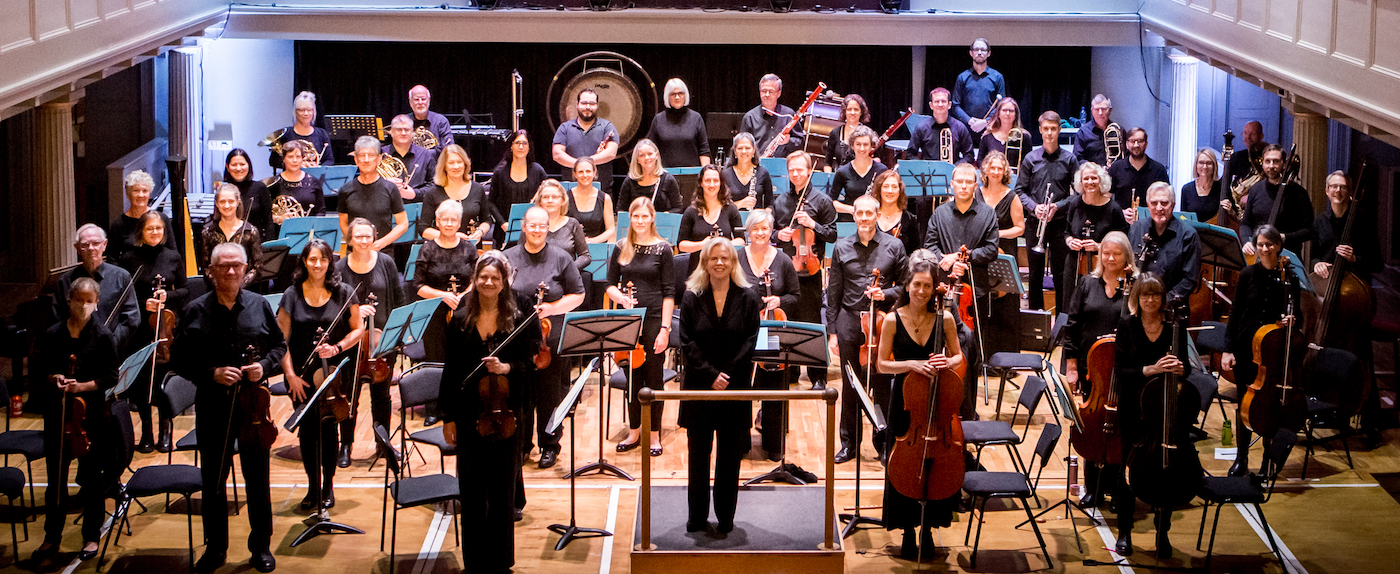
Brandon Hill Chamber Orchestra (BHCO) was formed in 1987 by four Bristol-based musicians who wanted to establish a non-professional orchestra capable of achieving the highest possible standards. The Greater Bristol area covers a large population, and the city and surrounding geographical beauty attract a wide number of people in all walks of life. The rationale to finding the route to success was multi-pronged : engage the services of a conductor who would be inspiring (making rehearsal and concerts both rewarding musically and pleasurable); discover the best musicians in the area who were prepared to commit time and effort into practice and performance for no financial return; play in the wonderful acoustic of St George’s, Brandon Hill, Bristol (for many years used by the BBC as a recording studio); rehearse intensively over the period immediately preceding the concert; and to promote high-quality events of varied and interesting content to be able to reward audiences, conductors, soloists and orchestra together.
BHCO began as a string orchestra but, due to the limitations in the repertoire, grew naturally into an ensemble of larger forces, ultimately being in the position of being able to perform a very large range of pieces from the Baroque period to the contemporary. Fortunately, due to the favourable surrounds at St George’s, it is feasible to stage some quite adventurous works that would normally employ greater string numbers (eg we have played Death and Transfiguration and Don Juan by Richard Strauss, Rachmaninoff’s Symphonic Dances, and Prokofiev’s ballet suites from Romeo and Juliet). Our basic size is 50-55. On 3 occasions in the 1990s we augmented forces to such a degree that we did not play in St George’s (we did Mahler’s 2nd, 3rd, and 8th symphonies) but all other concerts have been there and we have now played 75 times in this beautifully-restored former church.
In order to appropriate the services of the required standard of conductor we have needed to be “one step ahead of the game” ie identify artists who were on the verge of making the break into the professional scene, but hadn’t quite reached that level of demand on their time. It is a symbiotic relationship, because at that stage in their career, the conductors were keen to “cut their teeth” on an amateur ensemble (assuming it was good enough). To that end we have been extremely successful and have now worked with many conductors who are widely respected internationally. We have invited prizewinners of the Leeds Conductor’s Competition and have now collaborated with 4 of them – Grant Llewellyn (1986), Martyn Brabbins (1988), Paul Watkins (2001) and Alexander Shelley (2005) – the last winner. Grant Llewellyn is now principal conductor of the world-renowned Boston’s Handel and Haydn Society, music director of the North Carolina Symphony, and guest conductor of the BBC National Orchestra of Wales. He has featured many times in the BBC Proms festival.
Martyn Brabbins has had a long association with the BBC Scottish Symphony Orchestra and has recently been appointed as Principal Guest Conductor at the Royal Flemish Philharmonic. He appears regularly all over the world, has been the artistic director of the Cheltenham and St Magnus Festivals and remains in great demand; he also makes frequent appearances at the BBC Proms
Paul Watkins is one of the leading cellists and conductors today. Alexander Shelley is rapidly on the rise to stardom and has just been appointed principal conductor of the Nuremberg Symphony Orchestra.
In addition to the Leeds prizewinners we have also worked closely with 3 of today’s leading musicians –Christopher Hogwood, Douglas Boyd (who has appeared at 3 concerts at the BBC Proms) and Andrew Shulman.
Due to the calibre of conductors we have been able to accompany many great soloists including Julian Lloyd-Webber, Colin Carr, Bernard d’Ascoli, Tim Hugh, Marianne Thorsen, and Thomas Bowes (in addition to using the services of Paul Watkins and Andrew Shulman in their duel role of conductor/soloist). The key to our success has been the ability to discover the exciting talents of inspiring conductors and transfer those into dynamic performances in St George’s that can be enjoyed by the audiences.
BHCO has had numerous praiseworthy reviews in the Bristol Evening Post and our recent concert on 3rd October was described as “staggering playing”. Also we were reviewed in The Guardian once : a reporter attended 2 consecutive performances that Paul Watkins gave of the Brahms Double Concerto – firstly on the Friday with a professional orchestra in Wales, and then on the Saturday with BHCO in Bristol. The article clearly favoured the latter which was very encouraging for us. In 2006 BBC’s Radio 3 invited amateur orchestras nationally to submit a CD of a recording to be considered for broadcast. We were selected for our rendition of Copland’s Appalachian Spring conducted by Alexander Shelley. Shelley was interviewed by Radio 3 and then the performance ensued. Conductors and other artists consider BHCO to be amongst the very best of amateur orchestras in the UK.
A further example of BHCO’s stature is provided by its invitation to perform at 3 consecutive Cheltenham Festivals (2004-2006). We took part in 2 conducting masterclasses in the Pump Rooms with Martyn Brabbins and also played in the final concert in Tewkesbury Abbey.
Registered charity no. 1173054
